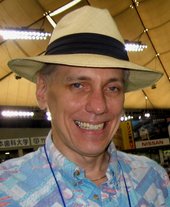
The Hot Corner: Notes from the interleague

The Hot Corner: Notes from the interleague
by Jim Allen (Jun 4, 2009)
Interleague play is half over and the Hawks have set the pace so far. What, if anything, can we take from Fukuoka SoftBank cutting a swath through Central League opposition? Are the Hawks really that good? Should we expect teams that do well against the other league to rev it up in the second half of the season?
Tuesday's 7-3 win left the birds of prey with a 9-1-1 record. One would be tempted to take that as evidence of more relaxed play under new manager Koji Akiyama. Of course, the Hawks lifted last year's interleague crown but were so uptight the rest of the season that they squeaked.
After struggling early and finding themselves in last place, the Hawks have gotten a welcome boost from a pair of unexpected sources.
For the second time in three seasons, Jose Ortiz has relaunched his Japan career from Mexico, joining the Hawks on April 30. In 28 games, he's hit as well as always but with more power than in previous stints with Orix and Chiba Lotte
Third-year outfielder Yuya Hasegawa didn't travel as far as Ortiz. It just seems the left-handed hitter with the exaggerated crouch came out of nowhere because he's hardly played.
SoftBank's new center fielder got hurt in his first spring camp, then collided with a pair of teammates in the outfield last summer. Entering the 2009 season with 353 career plate appearances from the Pacific and Western leagues, Hasegawa has had little chance to learn his craft at this level. He is, however, making the most of his few opportunities.
Last week at Jingu Stadium, he had a terrible-looking batting practice, fouling off pitch after pitch or hitting dribblers. Asked about his less-than-inspiring BP, Hasegawa said he was working on a specific issue and was satisfied the session was a success.
"I haven't played a lot of games," he said. "But every time I do, I discover hints about this or that. One by one, I try things out in practice and learn what I can do."
Another element that has helped the Hawks recover from their 3-8 start has been a change in batteries--as in pitchers and catchers.
Nagisa Arakaki, Shota Oba and Kameron Loe are no longer weighing down the rotation with their aggregate 7.12 ERA, while catcher Hiroaki Takaya has gone from Opening Day starter to backup.
In Takaya's starts, the Hawks are 9-10 and have allowed 4.45 runs per game. Through Tuesday, they were 13-7 and allowing 3.62 runs per game in starts by new No. 1 backstop, Hidenori Tanoue.
The team with the next best interleague record, the Hiroshima Carp (8-3 as of Tuesday), have not switched catchers but their rotation has become Japan's tightest outfit.
The Hawks and Carp have each used four regular starters in interleague with one spot start. They, along with the Tokyo Yakult Swallows (5-6), are the teams to have the largest portion of their starts on five-days rest or less.
Although data since 2006 suggests pitchers in Japan do better on longer rest, giving starters less rest allows a manager to take starts away from guys who aren't as good. While the gap between those Hawks currently jetting and those jettisoned is unusually large, even in Hiroshima, the difference is noticeable.
Three of the early season starters in the Carp rotation are not now starting: Junpei Shinoda, Takahiro Aoki and Masayuki Hasegawa. The three have an aggregate ERA of 3.92--more than a run higher than the 2.73 posted by all of Hiroshima's other starters.
Both the Hawks and Carp have played better than they did early in the season, but one has to wonder how much the first 11 games of interleague can say about the coming months.
The Carp have outscored interleague opponents despite having fewer base runners and not hitting for more power. This is the result of good timing.
The fish have won because they've had more big hits than their opponents. A lot of that is likely luck, and one reason why one shouldn't see the results of a few games as evidence of quality.
After all, the Yokohama BayStars (4-7), are batting .240 overall in interleague but .333 with men in scoring position--the largest advantage in Japan. But when your opponents reach base 30 percent more often than you do, all the big hits in the world won't make you a winner.
To access the original work (if still available), please reference:
http://www.yomiuri.co.jp/dy/sports/20090604TDY20304.htm.
Back to the works of Jim Allen
This work is licensed under a Creative Commons License.
Some rights reserved.
